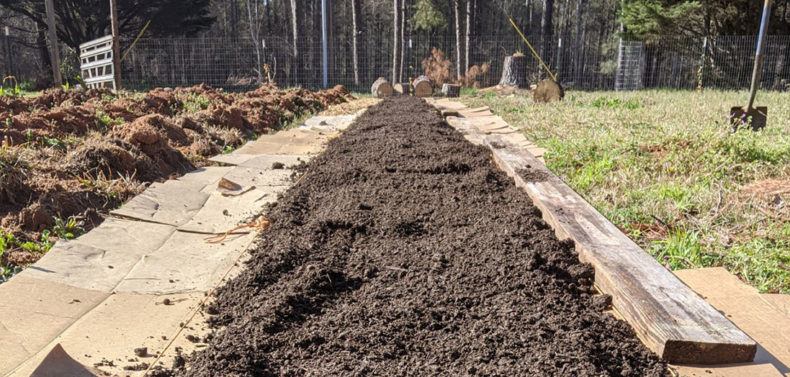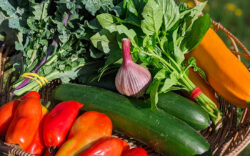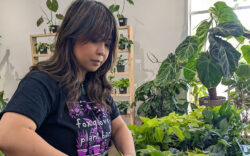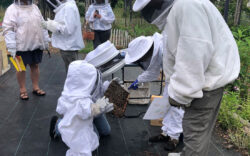You’ve mapped out your garden beds, bought your pots, and maybe dabbed a new layer of paint on your raised bed. What soil or compost do you use? Where do you get it from? How much is it going to cost? The Athens area hosts a wide variety of options at different price points for the small- or large-scale gardener.
Athens-Clarke County runs a commercial composting facility and produces two types of compost. The food-scraps compost is great for vegetable gardening but sells out quickly. I’ve never managed to snag any of it. Biosolids compost comes from treated wastewater solids suitable for composting, as well as leaf and limb debris. It works well for trees, rain gardens, pollinator gardens or any ornamentals. I’ve bought the biosolids compost several times, and while I make a lot of jokes about it, it does a good job. I don’t use it on my vegetable garden beds. The ACC landfill sells all compost for $20 a cubic yard (about one small truck bed) and $2 for a 5-gallon bucket. The landfill usually hosts a compost sale a few times a year and drops the price to $10 a cubic yard.
For larger plots, local landscaping companies offer plenty of options. Shoot for mixes where “compost” or “soil” is the main component, not “bark” or “wood products.” It’s more expensive, but if you’ve got the room, it’s worth it to spring for the best soil. I’ve tried the less expensive woodier options, and there’s a noticeable difference in seedling growth. Prices range from $20–$50 a truckload. Depending on where you live, your budget and if you have at least a 12-foot driveway, you can schedule a dump truck delivery as well.
For smaller plots, gardening stores and outlets seem to have hundreds of different soils. Remember, just because it says “container” or “in-ground” on the bag doesn’t mean that you have to use it for that purpose. Ignore the marketing on the front of the bag and instead, look at the back of the bag. Again, make sure that “compost” or “topsoil” is the first ingredient.
If you want to make your dollar stretch—yep, I’ve been there—try a two-to-one mixture of more expensive to less expensive. If you’re filling up a container and you’re not growing root vegetables, you can fill up the bottom of the container with leaves, branches, cardboard, kitchen scraps or anything else that will compost before topping with the better soil. I grew tomatoes, cucumbers, eggplant, beans and peppers in 4–6 inches of bagged soil on top of woody compost on a former gravel driveway. It’ll work. My preferred brand costs $10 a bag, so depending on the size and scope of your garden, budget $10–$100.
Buyer beware: Organic isn’t a term that the government regulates on soil. If organic matters to you, look for a third-party stamp like OMRI (Organic Materials Review Institute) on the bag. If it’s not there, it’s just greenwashing. The non-certified mixes also could include biosolids, which, based on your preferences, might be something that you want to avoid.
Bagged soil isn’t Earth-friendly. It comes in a plastic bag. Bagged soil, even the OMRI-certified kind, typically uses non-renewable resources like peat moss or renewable resources with large carbon footprints like coco coir. Even the most environmentally friendly ingredients still are shipped from far-away locations to manufacturing facilities and then to a store.
Maybe you care about sustainability. Maybe you don’t. But if you care about beautiful blooms, tasty vegetables and saving money, the best option is making your own compost. I know, I know. I suggest this and often get a list of reasons why the person cannot compost. Even professional plant people tell me all the reasons why it’s inconvenient for them.
If you’re serious about knowing what’s feeding the soil that’s feeding your plants, making your own is the best. Don’t know where to start? Go to the Athens-Clarke County Library and check out their composting books. I’ve read most of them, and there’s an excellent range from basics to technical. Your county extension agent will have tips as well.
Composting, like many things in life, is something you’ll do better with more experience. Don’t worry about the perfect pile the first time around. You’ll still be able to grow plants in it.
Like what you just read? Support Flagpole by making a donation today. Every dollar you give helps fund our ongoing mission to provide Athens with quality, independent journalism.










